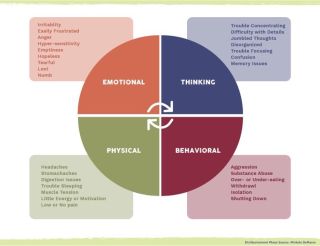Moral Injury
If You’re Feeling World-Wearied, You May Have 'Weltschmerz'
The disillusionment we feel when the world falls short of our expectations.
Posted January 9, 2023 Reviewed by Jessica Schrader
Key points
- Weltschmerz arises from feeling the existential weight that our ideals and expectations of how the world "should" be don’t line up with reality.
- One of the lesser-discussed effects of moral injury is this type of disillusionment.
- Disillusionment is shock and sadness mixed with a sense of betrayal.
Weltschmerz, literally “world pain” in German, arises when we come face-to-face with the unknowable “why” of evil and suffering, and from feeling the existential weight that our ideals and expectations of how the world ought to be don’t line up with the reality of our lived experience.
Weltschmerz is different from other familiar foreign expressions like angst and ennui. Angst is more inward-looking, describing a type of brooding anxiety or inner turmoil that results from sensing disharmony in life and our place in it. Ennui is more about lethargic disappointment or listless resignation that sets in when a person comes to believe that trying to change the world’s harsh realities is a futile effort. With weltschmerz there is a greater sense of yearning than with either angst or ennui—it is a deeply emotional, suffering-saturated cry that in our disillusionment about the workings of the world, we also see that things could and should be better.
How Disillusionment Lives Inside Us
The essential psycho-emotional effect of disillusionment is the shattering of innocence—that is, a “felt sense” within that makes our muscles tighten, our stomach turn, our jaw clench, our mind erupt, or our heart crush when we suddenly become aware that we, others, and even life itself are imperfect and limited and don’t measure up to our assumptions or beliefs. Disillusionment causes people to lose faith that there is safety, predictability, or meaning in the world, and this affects us at an embodied level.
Dr. Kira Mauseth, co-lead of Washington state’s Behavioral Health Strike Team and a senior instructor of psychology at Seattle University, studies resilience and recovery from trauma, like moral injury. She suggests that when a traumatic event or disaster occurs, disillusionment begins to set in when cortisol—our principal stress hormone—overwhelms the brain (Carely, 2020). “Our brains are constantly scanning for threats …” This state of hyperarousal (Corrigan et al., 2011), commonly referred to as the fight/flight response, is associated with the sympathetic nervous system and is a system “stuck on.” A person can become hypervigilant, anxious, panicky, angry, overwhelmed, or consumed by racing thoughts. It can be hard to relax or sleep. They might also experience chronic pain or digestion issues—what we often call a “nervous stomach.” When a system is stuck on for too long, however, it can eventually “shut off," or go into a state of hypoarousal (Corrigan et al., 2011). Hypoarousal causes people to shut down, withdraw, or feel numb, empty, exhausted, depressed, and stuck. They may have little energy or motivation. They may also become disoriented or dissociate.
The chart below shows the gambit of how disillusionment or weltschmerz affects us:

How We Can Overcome Feelings of Weltschmerz
Leonard Cohen’s song (Cohen, 2020) gives us a good overview: “Ring the bells that still can ring / Forget your perfect offering / There is a crack, a crack in everything / That’s how the light gets in.” The yearning for more, better, now in the world that is associated with weltschmerz is actually a sign of hope—similar to the pain of moral injury being a sign of abiding goodness.
Here are some additional tips:
- Don’t expect perfection—from the world, others, even yourself. It doesn’t exist. Life is always going to fall short of our needs, wants, and desires. While having core values, moral conviction, and high standards is a great thing, having impossible ones for everyone to live up to will only lead to ongoing anger, bitterness, and disappointment. It’s better to engage in what I call “sensible striving”—that is, a clear-eyed, open-minded, heart-full approach to life that endeavors for the best, knowing full well that it’s not attainable.
- Embrace the “both/and” standard, and set expectations accordingly. The “both/and” standard recognizes that there is both good and bad in people and in life. Set the bar at what you desire it to be, and then adjust down a bit and operate from there. This ensures your values aren’t compromised, but it also sets you up to be pleasantly surprised, rather than let down.
- Seek out the small stuff. Instead of “sweating the small stuff” that makes our heart race and causes our head to spiral off our shoulders, try seizing on small moments of meaning, purpose, value, connection, joy, and transcendence. Try making small change where you can, whether that’s in your own life or in the greater community. And then frame these experiences as a victory.
- Struggle well. Disillusionment and world-weariness aren’t particularly pleasant experiences. And despite our best intentions and efforts, we may find ourselves in a coping crisis. It’s good to remind ourselves that it’s OK to feel this way. Our job is to do the best we can with ourselves, and sometimes that means allowing ourselves to be sad, scared, forlorn, etc. Practicing benevolent honesty (DeMarco, 2021a) is one healthy way to struggle well.
If your world-weariness starts to get particularly heavy, here are some specific practices to help pull you out:
- For anxiety, anger, or anything else that makes you hot under the collar, try the “Diver’s Reflex” (DeMarco, 2021b).
- For depression or feeling shut down, try bouncing on a fitness ball or swinging your arms across your body for five minutes. Also, try the “astronaut walk": slow, intentional, exaggerated stomping on the ground, or chewing crunchy food or gum with exaggeration, as if you’re trying to explain how to do it to a child. Anything that arouses your senses can be helpful for getting out of a lethargic stuck state.
- It’s also helpful to understand your window of tolerance (DeMarco, 2020a) that keeps you in an optimal embodied state.
- Here’s an unexpected one: nostalgia. Studies (Mayer et al., 2020) show that the past can provide solace as a source of meaning and connection. Pull out old photos or memorabilia that make you smile. Watch a favorite movie or show from childhood. Talk or write to a long-time friend or family member who holds or shares your story. It’s amazing how past fondness and glory can replenish and reaffirm meaning and lift us out of our world-weariness.
John Milton said in Paradise Lost, “Long is the way and hard, that out of Hell leads up to light.” No one likes to be drop-kicked out of whatever utopia their innocent beliefs and expectations lived in. And thanks to recent events, such as the COVID-19 pandemic, the sociocultural and political unrest, and a precarious economy, it often feels as though the existential boot-to-the-butt has been working overtime. It’s entirely natural to feel the weight of weltschmerz and want to rage and then withdraw, over and over, until we finally shut down.
There is a tendency today to want to “cancel” psychic or moral pain, but the capacity to be disappointed, even disillusioned can be a good thing. There is a parallel with physical pain: while discomforting, the inability to feel is extremely dangerous. World pain is distressing, but numbness to it is worse.
*Adapted from Greater Columbia Accountable Community of Health and Forecasted Behavioral Health Impacts from COVID-19.
About
Dr. DeMarco is an award-winning writer, and a therapist, clinical ethicist, and trauma researcher specializing in moral injury and moral distress. She is the author of the Psychology Today blog “Soul Console: Healing from Moral Injury” and one of Medium’s Top Writers for Mental Health and Health, respectively. Her writing has appeared in national and international publications, including the New York Times, POLITICO, The Boston Globe, Psychology Today, and The War Horse, among others. She’s also been featured as a trauma, health, and spirituality expert for MindBodyGreen, Integrative Practitioner, Lifehacker, Bloomberg/WNBP Radio, Partners HealthCare, and the American Heart Association. Her new book Holding Onto Air: the Art and Science of Building a Resilient Spirit is now available.
References
Carley, C. (2020). The disillusionment phase of the pandemic is upon us: What that means for our mental health. Seatle Met. Retrieved https://www.seattlemet.com/health-and-wellness/2020/10/the-disillusionment-phase-of-the-pandemic-is-upon-us
Corrigan, F., Fisher, J. J., & Nutt, D. J. (2011). Autonomic dysregulation and the Window of Tolerance Model of the effects of complex emotional trauma. Journal of Psychopharmacology, 25, 17-25. doi: 10.1177/0269881109354930.
Cohen, L. (2020). Anthem. [Video]. YouTube. https://www.youtube.com/watch?v=c8-BT6y_wYg
DeMarco, M. (2020a). Unraveling? Your stress levels are likely beyond your ‘window of tolerance’: Tips to reset your brain and body when everything feels impossible. Elemental. https://elemental.medium.com/unraveling-your-stress-levels-are-likely-beyond-your-window-of-tolerance-f696a78f9257
DeMarco, M. (2020b). Surprising breathing exercises to instantly reduce stress: Conscious breathing, cellular breathing, and other easy techniques to feel calmer. Elemental. https://elemental.medium.com/7-surprising-breathing-exercises-to-instantly-reduce-stress-9cbb61a1d635
DeMarco, M. (2021a). When it comes to painful emotions, don’t think — just feel: Some things are just sad. Elemental. Retrieved https://elemental.medium.com/when-it-comes-to-painful-emotions-dont-think-just-feel-cab4d9ef9a6a
DeMarco, M. (2021b). Yes, you can get instant relief for anxiety: Turns out humans are designed for it through the “diver’s reflex”. Medium. https://michelejdemarco.medium.com/yes-you-can-get-instant-relief-for-anxiety-ec18064583f7
Maher, P. J., Igou, E. R., & van Tilburg, W. A. P. (2020). Nostalgia relieves the disillusioned mind. Journal of Experimental Social Psychology. doi: 10.1016/j.jesp.2020.104061.


